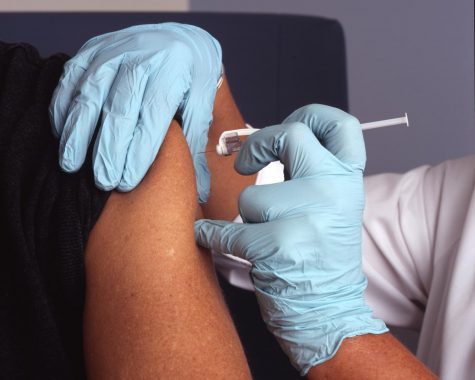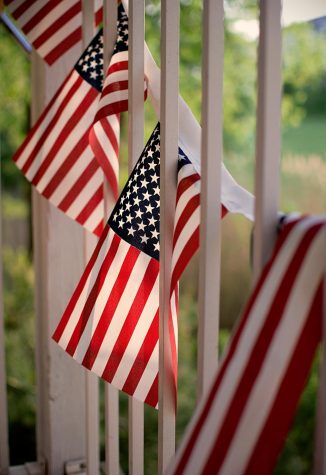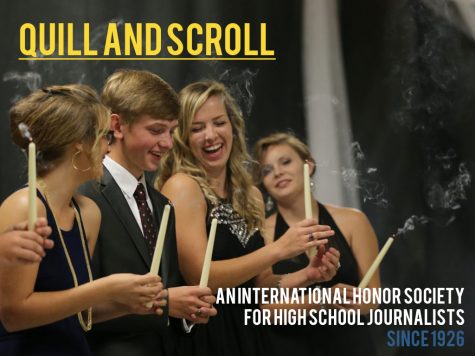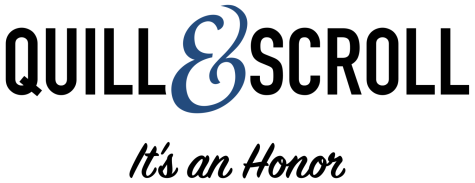THE WEEKLY SCROLL
November 12, 2020
News, tips and advice from Quill and Scroll
The Lede
COVID-19 vaccine?
Pfizer releases data showing 90% effective rate of vaccine, will apply for emergency use approval

Photo by National Cancer Institute on Unsplash
Officials from Pfizer, a pharmaceutical corporation based in the United States, and its German partner BioNTech, announced Monday their COVID-19 vaccine has appeared to be 90% effective in their incomplete test results that will be finished in late November. It’s high effectiveness rate is a surprise to many health officials – most flu vaccines are only 40-60 percent effective.
The news comes as COVID-19 cases reach an all time high across the United States, averaging over 120,000 new positive cases per day, with an average death rate of over 900 lives per day.
With the possibility of a vaccine coming at a critical time in case progression, Pfizer hopes to apply for emergency-use approval by the US Food and Drug Administration by the end of the month. In order to do so, Pfizer must complete the necessary safety evaluation and research trials. If all goes well, Pfizer says it can have enough vaccines produced by the end of 2020 for 25 million people.
Notably, the Pfizer vaccine is mRNA-based, meaning, the vaccine does not inject coronavirus into your body, resulting in a chance of getting sick from the vaccine itself.
There are six vaccines across the globe that have been approved for early and limited use and 10 vaccines are within the final stages of testing.
How will COVID-19 vaccines be administered once approved?
Administering the COVID-19 vaccine brings up a whole new batch of questions. The biggest may be when the vaccine will be available to the general public.
Vaccines in late stage testing require being stored at extremely cold temperatures.This proves to be a problem because of the lack of storage facilities located around the world. In order to store a large quantity of vaccines, you need a large area open and available for these vaccines. If vaccines are not maintained at that low temperature throughout their life (from factory, to travel, to storage facility, to you), the vaccine goes unused because it is no longer effective.
Once vaccines are authorized, the US Food and Drug Administration also can dictate what populations can receive the vaccine first. Most assume the vaccine will be given to high-risk populations and essential workers first.
2020 election results
The media has called the election: what now?
The Associated Press and several major news outlets called the 2020 Presidential Election in favor of former Vice President Joe Biden Saturday morning after Biden was projected to win Pennsylvania, an important swing state this election season. Yet, Biden remains “President-Elect” until the vote is confirmed by the Electoral College and approved by Congress. Because President Donald Trump has yet to concede the election, this leaves the U.S. government in limbo for as long as Trump threatens to challenge the result in court.
The media is calling the winner of the 2020 election before it has been confirmed by the Electoral College and Congress. But why?
The Associated Press began “calling the election” in 1848, declaring Zachary Taylor the President of the United States. Similar to how vote counts were hindered by COVID-19 this year, voting in the 19th century took place over many days and left Americans without a clear answer on the identity of the next president. Now, you might have noticed, Americans aren’t known to be the most patient people. This led the Associated Press and other news corporations to begin “calling the election” based on tabulated results, polling predictions and analyzing data to determine the President-elect. Television and Radio programs began calling the election, along with news organizations, in the 1960 race of Senator John F. Kennedy and at the time former Vice President Richard Nixon.
Elections are called based off the collections of media representatives stationed in all 50 states and state and county websites. State-based analysts then compare existing vote count to other data that can predict how a certain area or population will vote, using demographics and voting history.
This isn’t a fool-proof system, but the widespread use of predictions validates the process as being worthwhile. The most notable mistake made by journalism organizations was in 2000 when Fox News called the race for George W. Bush on election night. However, the race in Florida was still undecided until December was when the U.S. Supreme Court ordered Florida to stop counting ballots, thus preserving Bush’s minuscule lead and making him the 43rd president. Several independent recounts after the Supreme Court decision posited that Democrat Al Gore — the candidate who earned the most popular votes nationwide — would also have won Florida, and thus the presidency, had the counting continued.
The Associated Press called the 2020 election in favor of Joe Biden because his predicted electoral vote count rose over 270 (the number of votes needed to win a presidential election). On top of this, data showed Biden’s vote count would continue to rise because mail-in ballots were the last ballots to be counted in many states (President Trump urged his supporters not to vote by mail).
Still curious? Check out the video below by PBS News Hour.
Championing for United States Veterans
Veterans make up only 2% of journalists, but 7% of the entire U.S. population

Photo by Isabella and Louisa Fischer on Unsplash
Nations across the world celebrate Veteran’s Day on November 11 each year. In the United States, veterans make up nearly 7 percent of our population (roughly 17 million people). Yet, only 2 percent of the veteran population work as journalists.
The Poynter Institute recently covered the story of Zack Baddorf, a veteran who struggled to break into the journalism field immediately after serving in the US Navy. He eventually free-lanced for The New York Times and The Associated Press, but wanted to find a way to serve other veterans looking to break into the journalism field.
Baddorf founded Military Veterans in Journalism (MVJ) with hopes to increase the ease of transition from military life into journalism and the number of opportunities available to veterans within journalism. Wednesday, MVJ announced a partnership with the Knight Foundation, who invested $250,000 into MVJ to fund fellowships, workshops and resource sharing. The sum will also fund two full-time jobs at MVJ for veteran journalists.
The journalism industry often focuses on championing underrepresented voices: MVJ considers the veteran perspective to be one of those voices. Veteran and veteran families are a part of the media audience, but are vastly underemployed in the industry itself, limiting the perspective that only a veteran can give to specific stories.
Quill and Scroll’s founding principles align with the skills veterans possess because of their service to our country. We consider integrity, loyalty, leadership and judgement to be some of our most prized characteristics of journalists. All veterans are selfless examples of these principles: we would be lucky to have their perspective shared in present media.
It’s An Honor
 Q&S Updates
Q&S Updates
Q&S Board allows non-school chapters to form
The Quill and Scroll Board of Trustees amended its constitution this month to allow non-school organizations to apply for charters and, if granted, to form chapters with the students inducted into the organization. This week, Eye on Ivy, an educational consulting firm based in Pakistan, became the first non-school organization to apply for and be granted a charter. Eye on Ivy works with students who produce content for national, regional and school publications, both in print and online.
We anticipate welcoming other new chapters in places around the world and in the U.S., including local news outlets that publish stories written and/or produced by high school students.
The amended constitution does not change the basic qualifications for induction into the society. Though some schools have more stringent requirements, students need to:
- Excel in the academic arena by earning a 3.0 GPA or by being in the top-third of a student’s class.
- Excel in journalism by doing significant work in a publication, broadcast entity or an online news source.
It’s never too late (or early!) to honor seniors and induct members
If you put off your spring celebrations, you can still induct new Quill and Scroll members and honor seniors this fall. We’re able to take and fulfill orders, even as Quill and Scroll staff work from both our home offices and our offices at the Adler Journalism Building on the University of Iowa campus.
We published this update earlier in August. It includes a simplified order form for schools and advisers willing to pay via credit card, and an offer to host an online induction ceremony for your students. The sooner you induct new members, the sooner they’ll be able start planning chapter activities in the spirit of Quill and Scroll. Here’s a link to a PDF file of the Q&S Chapter Handbook if you don’t already have it.
A reminder about cords:
Students MUST HAVE BEEN OR WILL BE INDUCTED into the Society to earn the honor to wear an Honor Cord (GHC) or Honor Cord with Insignia (GCI). If you order cords for non-members, please choose the Non-Member Cord Option (NCD). Quill and Scroll exists because of the special unifying bond brought about by membership and the lasting legacy of the induction ceremony.
And, as always, feel free to email [email protected] if you have any questions.
Yearbook Excellence Contest closed for entries
Quill and Scroll’s 2020 Yearbook Excellence Contest closed for entries on Oct. 17. We are in the process of distributing over 1,000 entries to our judges.
Winners will be announced in early December. Until then, keep producing great journalism!
Writing, Photo and Multimedia Contest is next!
Get ready to start submitting entries for the Writing, Photo and Multimedia Contest starting in December. The final entry deadline will be Feb. 10, but it’s never too early to start looking at your best work and deciding which and how many to enter.
For the first time, the WPM Contest will be split into Class A (large schools) and Class B (not-as-large schools) based on enrollment. That means more chances to earn a first, second or third place. As always, at least 10 percent of all entries will be recognized as winners.
We’ve added three new categories:
- Sports Game Coverage
- Pandemic Coverage (Single Story)
- Pandemic Coverage (Series of Stories)
Here’s where you can find all the categories, as well as last year’s winners.
Director summarizes 2019-2020
If you’re interested in reviewing the 2019-2020 fiscal year, read Jeff Browne’s full annual report, click here.
What’s Viral?
Spotting misinformation on the web
Tips to confirm, or debunk, suspicious media claims
The tense 2020 election came with Republican claims of voter fraud in multiple close race states, including Michigan, where a viral video circulated featuring a red wagon carrying an unmarked package into a polling station at two in the morning. The video was even retweeted by Eric Trump, further insinuating voter fraud in the state of Michigan.
Tomorrow's lesson for students on the mechanics of disinformation. A smoking gun video allegedly showing ballots being wheeled to Detroit's counting center during the wee hours of the night. The video's been viewed a million times (here & elsewhere). 1/10 https://t.co/pVq5xS0RwU
— Sam Wineburg (@samwineburg) November 11, 2020
Sam Wineburg, a Professor at Stanford University, created a Twitter thread investigating the video and teaching students how to do this for themselves when they encounter suspicious media. Here’s some of his tips:
- Google the event in question. Use specific key words that relate to the information at hand, rather than broad topics that may include other past events.
- Look for reliable, well-known sources if possible. If a news source is reliable, it is going to have a paper trail.
- Once you find a source that appears to be reliable, research the source if you are unfamiliar with it through a quick Google Search.
These might seem like pretty simple steps, but sometimes Google can get clogged with misinformation from unreliable sites. Continue to investigate to find the most reliable information before drawing a conclusion from the material.
The video that circulated widely on media insinuating voter fraud, was indeed, misinformed. Check out the video below to understand what was really going on:
Presidential pups
Biden returns longstanding tradition of housing presidential pets
With the predicted results of the 2020 Presidential Election, President Elect Joe Biden will bring a longstanding tradition back to the White House: presidential pets! When Biden’s term commences in January, he and his wife, Dr. Jill Biden, will move into the Pennsylvania Ave. address with their two German Shepherds, Major and Champ.
Build Bark Better.
Happy #NationalDogDay. pic.twitter.com/64HXEBscwO
— Dr. Jill Biden (@DrBiden) August 26, 2020
You may recall Bo and Sunny, the Obama’s two Portuguese Water Dogs that President Barack Obama gifted to his daughters, Sasha and Malia, after the 2008 and 2012 elections. Both pups received quite a bit of media attention, not unlike their predecessors dating back to the beginning of the twentieth century.
President Trump’s term in office marked the first time their were no pets kept in the White House since President James Polk from 1845-1849. However, President Van Buren was gifted a pair of tiger cubs and was forced to give them to a zoo, leaving the White House petless.
President Kennedy and President Coolidge are well known for their vast assortment of pets.
‘I Am Greta’
New Hulu documentary follows Greta Thunberg from the beginning of her protests
Hulu will release a new documentary following the two-year journey to fame of Greta Thunberg, Times’ “Person of the Year” 2019, and spearhead of Generation Z’s push for environmental reform on Friday. Nathan Grossman began producing the documentary shortly after Thunberg began her protest outside of the Swedish Parliament in 2018.
The documentary follows Thunberg’s journey across the world as she raised awareness of climate change the “mass extinction” she believes the world is soon going to fall victim to. It also shines light on the humanness of Thunberg as an eighteen-year-old public figure.
Here at Quill and Scroll, we’ve covered Thunberg before: she made a trip to Iowa City in October of 2019. Take a look at our footage from her rally from this archived Weekly Scroll, as well as her Time “Person of the Year” award.
You can watch the documentary with a Hulu subscription, Prime Video or Apple TV.
Just A Thought
The ‘Trump Rule’ and restoring truth to the American nation
Americans have lost their value of truth, and we need to get it back

Photo by Markus Winkler on Unsplash
Thomas Friedman, columnist for The New York Times, cites truth as a forgotten commandment in his article, “Only Truth Can Save Our Democracy,” — one that has been replaced by the Trump Administration’s efforts to simply not get caught.
“It is impossible to maintain a free society when leaders and news purveyors feel at liberty to spread lies without sanction. Without truth there is no agreed-upon path forward, and without trust there is no way to go down that path together.”
Friedman encourages the implementation of the “Trump Rule,” a standard that requires media platforms to remove any utterance of falsehood before it has the potential to grow and damage the American public. Friedman states, “If critics scream ‘censorship,’ just shout back ‘truth.'”
We’ve covered truth a lot here at Quill and Scroll. As one of our eight founding principles, we value the ability to tell the truth (and remain with the truth) as the highest mark of journalistic integrity. To be a scholar in our organization, you’re required to take the following pledge:
I do pledge myself —
To do all in my power —
To work for the advancement of my community, —
To be loyal to the public —
To live up to the ideals of true journalism, —
And to be impartial in my interpretation of truth.
Truth is important. It’s not partisan or subjective: truth remains as a deciphering factor of information used in journalism and politics.
But really, telling the truth is vitally important to every aspect of life. Without it, our lives become muddled and uncertain – as anything can and will be professed as the truth, truth as mistruths, and mistruths as lies.
